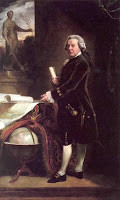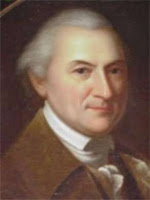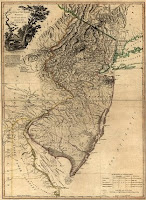
In pondering the what and when of the American Revolution years after it was over, John Adams famously asked Thomas Jefferson, "What do we mean by the Revolution?" Answering his own question, he asserted that "The Revolution was in the minds of the people, and this was effected from 1760 to 1775, in the course of fifteen years before a drop of blood was spilled at Lexington." Some schools of historical thought have long since come to embrace Adams's perspective. The realization that something truly revolutionary had happened, must have happened, "in the minds of the people" in order for them to willingly forsake and take up arms against the world's greatest military power is invaluable. Yet it is a mistake, one that Adams should have known better than to make, to imagine that the 'revolution' in the minds of American colonists was over by 1775. Adams's home region of New England might have been strongly, if not unanimously, convinced that a radical change in imperial relations with Britain was necessary by the time that blood was shed at Lexington, but America as a whole was still far from committed to the road to independence.
I've been reminded of this over the past week as I've read several books and articles describing the immense amount of effort exerted to move the colony of Pennsylvania into the pro-Independence camp by 1776. When John Adams arrived in Philadelphia for the Second Continental Congress in 1775, he found that while revolutionary sentiment was strong in New England and the South, the middle colonies were remarkably reluctant to take up the standard against Great Britain. Pennsylvania, as the most populous colony, centrally located, and home of the largest metropolis in British America, seemed to be the key; if Pennsylvania could be persuaded to vote for independence, many suspected that the other holdouts (New York, New Jersey, Maryland and Delaware) would follow.
But colonial Pennsylvania was not a province inclined to radical change. It's population was fragmented, divided into numerous ethnic and religious groups who, long blessed by the colony's unusual level of political and religious tolerance, were not accustomed to having to conform themselves to any particular viewpoint. Furthermore, political power was largely held by the Pennsylvania Assembly, a conservative legislative body that sent delegates to the Congress with strict instructions "to dissent from and utterly reject any Proposition...that may cause, or lead to, a Separation from our Mother Country." Independents and radical-patriots had long been at work in the colony, and particularly in Philadelphia, to change the minds of the Assembly and of the people on the question of independence. They formed popular, though unofficial, committees to advocate for (and later to enforce) rules against importing or consuming British goods. They created a militia system (a novelty in the Quaker colony) to defend themselves and bring more people into their camp. They identified those they perceived as "Tories" or unfriendly to the "American cause" and, at times, persecuted them by means of questionable legality. They failed, however, to persuade the Assembly to embrace independence and in the general election of 1775 the people of Pennsylvania, with few exceptions, re-elected the same conservative members they had elected in '74; Pennsylvania continued to resist separation from Britain.
Undeterred, the pro-independence party decided that if they could not change the Assembly's mind, they must change the Assembly itself. For years it had been known that the Assembly, always slow to adjust to changes in population, gave less than equal representation to the western and northern counties and to the city of Philadelphia. Believing that the these were strongholds of pro-Independence sentiment, the Committee of the City of Philadelphia demanded that additional Assembly seats be allocated to the backcountry and the city. The Assembly, fearing that the mass committees were rapidly taking control of the province, acquiesced and created seventeen new seats for Philadelphia and the western counties. The Independent's victory turned to ashes, however, when three of the four new Assemblymen chosen by Philadelphia opposed separation from Britain. The results from the western counties were likewise mixed, and the newly enlarged Assembly merely reiterated its stance against declaring independence.

And so we return to John Adams who, attending the Congress in Philadelphia and personally devoted to severing America's political ties with Britain, watched these happenings with dismay. Supported by other pro-independence delegates to the congress and radical leaders in Pennsylvania, Adams decided that if the government of Pennsylvania and the other holdout colonies could not be brought to support the cause, then those governments must be overthrown. On May 10, Adams helped introduce a resolve into Congress calling on all colonies which lacked a "government sufficient to the exigencies of their affairs" (meaning, to Adams, a government unwilling to vote for independence) to replace them with new, more "sufficient" governments. To the surprise of Adams and his pro-independence allies, the resolution was passed unanimously. Even John Dickinson, a Pennsylvania delegate who strongly opposed independence, supported the measure, pointing out that Pennsylvania's government was running along quite smoothly and seemed perfectly capable, as far as running the province was concerned, despite its opposition to independence. Others agreed with Dickinson's interpretation, and once again, it seemed that the hopes for winning Pennsylvania's vote in the Congress had been dashed.
But Adams refused to give up. Given the task of creating a preamble explaining the purpose of the May 10 resolution, he was determined to make it apply to Pennsylvania one way or another. The resulting preamble explained that, in light of the actions of King George III against the colonies, "it is necessary that the exercise of every kind of authority under the said crown should be totally suppressed." In short, any government established under royal authority was to be shut down. This unambiguously applied to the Pennsylvania Assembly which, in theory, derived its authority from the monarch. It also called into question the legitimacy of several pro-Independence votes in the Congress, but this was generally ignored. Whereas the May 10 resolution had passed unanimously, Adams's preamble provoked a stormy debate before it was put to the vote on May 15. The middle colonies, at which the resolution was ostensibly aimed, all either voted against the preamble or abstained, calling it a defacto declaration of independence, but they were outvoted by New England and the South. Adams himself fully recognized the importance of what he had accomplished, calling it "the most important Resolution that ever was taken in America." Following the vote, the Maryland delegation packed their bags and departed, stating that they would not return until they had had time to consult with those at home "upon this alarming situation."
Pennsylvania was immediately embroiled in a political battle, centered in Philadelphia, over the legitimacy of Congress's resolution, the need to form a new government, and how that government should be created. Thousands gathered in mass meetings in the city, either calling for or rejecting a Provincial Convention which would decide how a new provincial constitution should be created. Both sides crafted letters and petitions to be sent out to the backcountry for support, but the Independents, who tended to dominate the committees and militias throughout the colony, were better organized. Supporters of the old Assembly who took their party's petitions to the western counties were intercepted along the way or upon arrival. Some had their papers confiscated, others were 'strongly encouraged' to turn around and ride back Philadelphia. They nonetheless obtained thousands of signatures in support of the existing Assembly, but events were turning against them. By June 8, the Assembly realized that its place as the governing authority of Pennsylvania was endangered. In a desperate bid to win over radical support it sent new instructions to the Pennsylvania delegates in the Continental Congress, freeing them to vote for or against independence as they saw fit. In the end, it wouldn't matter.
A Provincial Convention, made up of delegates from the various Pennsylvania committees, met on June 18. They decided that a constitutional convention should be called in order to draft a new form of government. But remembering how badly the election of May 1 had gone for the pro-Independence party, they decided to stack the odds in their favor when it came to electing delegates to this new convention. The normal franchise requirements would be imposed on potential voters with three exceptions: militia members over 21 would get special treatment and be exempt from some of the property requirements, anyone who wished to vote could be required to swear an oath renouncing the king of Great Britain and promising to support any government established by the Continental Congress, and anyone who the committees had previously declared an 'enemy of this country' (a label liberally applied to those who, for example, "damned Congress") was forbidden from casting a ballot. These provisions guaranteed that the pro-independence and radical factions would dominate the constitutional convention, and so they did.
By early July it was clear that Pennsylvania was moving, or being moved, into the independence camp. Several members of the province's delegation to the Continental Congress, John Dickinson among them, recognized the futility to continued resistance. Yet still unwilling to vote
for separation from Britain, Dickinson simply abstained and let the more revolutionary members of the delegation decide the fate of the colony. On July 2, Pennsylvania voted for independence and the United States officially severed their political ties with Great Britain. The following day Adams wrote to his wife that "
The second day of July, 1776, will be the most memorable epoch in the history of America. I am apt to believe that it will be celebrated by succeeding generations as the great anniversary festival....It ought to be solemnized with pomp and parade, with shows, games, sports, guns, bells, bonfires, and illuminations, from one end of this continent to the other, from this time forward forever more." He rightly considered himself to be one of the major figures involved in bringing that "memorable epoch" about. In years to come it would be an annual irritant for him that the nation adopted as its grand anniversary, not the 2nd, but the 4th of July, when Congress approved the famed Declaration laying out the justification for the separation from Britain, and that it was Jefferson whose name came to be most closely associated with that day.
Pennsylvania would wrestle with the aftermath of the turmoil of '76 for years to come. The new constitution remembered variously as the most "liberal", "radical" or "democratic" of the new state constitutions, would be wildly controversial and face constant opposition until it was finally replaced in 1790. Most Pennsylvanians, regardless of their original views of independence, would eventually reconcile themselves to separation from Britain, but there were thousands who would not. Some sold their property, packed their bags and departed voluntarily. Others were chased out by angry mobs and a new government that tolerated little dissent. Some were imprisoned and deported; a very few were executed. Many more flooded into Philadelphia when the British Army occupied the city in 1777, departing with them in 1778 to take up new lives in Canada, Britain, the Caribbean or other ports still loyal to the empire.
The "minds of the people" would remain flexible throughout the war, and men like Adams's labored diligently to mold them into conformance with their visions of America's future, at times employing some questionable tactics. In remembering the Revolution, we would do well to avoid Adams's somewhat self-serving claim that the crucial transformation in the American mind was complete by '75. The line between 'patriot' and 'loyalist,' between British and 'American', remained blurry long after Lexington and Concord. Like so many conflicts, both past and present, the American Revolution was gray at its center, despite the attempts of activists on either side to cast it as black and white.
Brunhouse, Robert Levere. The Counter-Revolution in Pennsylvania, 1776-1790. Harrisburg: Pennsylvania Historical Commission, 1942.
Hawke, David. In the Midst of a Revolution. Philadelphia: University of Pennsylvania Press, 1961.
Ousterhout, Anne M. A State Divided: Opposition in Pennsylvania to the American Revolution. Westport, Conn: Greenwood, 1987.
Rosswurm, Steven. Arms, Country, and Class: The Philadelphia Militia and "lower Sort" During the American Revolution, 1775-1783. New Brunswick, NJ: Rutgers University Press, 1987.
Ryerson, Richard Alan. The Revolution Is Now Begun: The Radical Committees of Philadelphia, 1765-1776. Philadelphia: University of Pennsylvania Press, 1978.





